When exploring The Elder Scrolls IV: Oblivion, a locked chest or door often holds treasures that tempt us like a carrot on a stick. Whether you’re chasing gold, rare items, or secret areas, lockpicking is one skill you need to master. At first glance, the lockpicking system in Oblivion may seem intimidating, but trust us, it’s actually a rewarding mechanic once you get the hang of it. That’s why we’re here: this Elder Scrolls Oblivion lockpicking guide will walk you through the tricks, tools, and strategies to tackle even the toughest locks with confidence.

- The main quest centers on closing Oblivion gates and stopping a demonic invasion.
Understanding the Oblivion Lockpicking System
Lockpicking in Oblivion isn’t as simple as holding down a button. Instead, the game challenges you with a lockpicking minigame. Picture this: a lock with multiple tumblers, each needing to be nudged upward into position before you can unlock it. Sounds simple, right? Well, each tumbler has its own rhythm, and not all sweet spots are easy to hit.
The Basics of the Lockpicking Minigame
1. The Tumblers: Different locks have anywhere from one to five tumblers, depending on their difficulty. Your job is to set each one in place.
2. The Sweet Spot: Tumblers need to lock into place at the right time. When a tumbler is pushed upward, it stays briefly before dropping. That split second is your sweet spot!
3. Manual vs. Auto-Attempt: You can either play the lockpicking minigame manually or let the game try its luck with an “auto-attempt.” Be warned, auto-attempt relies on your Security skill; great for easy locks, but often unreliable for harder ones.

- Each lock has between one and five tumblers, depending on its difficulty level.
Locks also come in five difficulty levels: Easy, Average, Hard, Very Hard, and Impossible. Your ability to pick them depends not only on your skill but also on your stockpile of lockpicks and patience.
Step-By-Step Guide to Manual Lockpicking
Mastering Oblivion lockpicking takes practice, but we’ll break it down step by step to set you on the right path.
1. Start with Easy Locks: Begin your lockpicking career on simple, one-tumbler locks to get a feel for the mechanics. Push up the tumbler and immediately release your mouse or button when you hear a soft “click.”
2. Watch the Tumblers: Pay attention to the speed and weight of each tumbler. Heavier tumblers move slower, giving you more reaction time, while lighter ones require quicker reflexes.
3. Listen for the Audio Cue: When a tumbler reaches the top, you’ll hear an unmistakable “click” sound. That’s your signal to lock it into place.
4. Take Your Time: Precision is key. Rushing leads to wasted lockpicks, especially on challenging locks. Wait for the right moment!
5. Adjust for Controller or Mouse/Keyboard: Whether you’re playing on PC or console, practice with your input method to build muscle memory. Controller players may find it easier to time the clicks using the trigger buttons, while mouse users can build precision with quick taps.
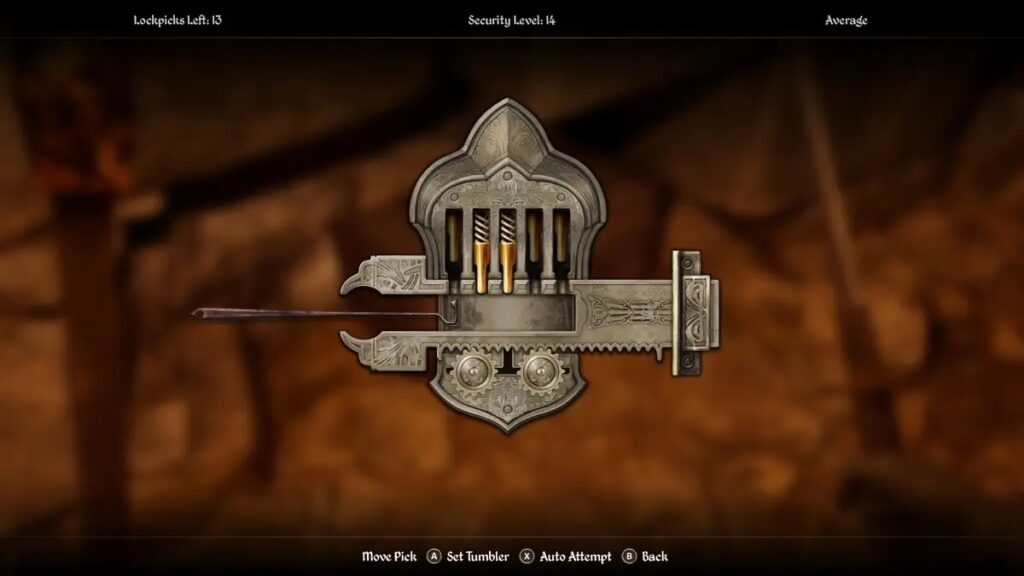
- Lockpicks can break if you mistime the set or rush the process.
For tougher locks, remember: confidence is your greatest weapon. Each success boosts your Security skill, which will eventually make this whole process feel like second nature.
Essential Lockpicking Tools & Skills
Your success in Oblivion lockpicking depends not only on your reflexes but also on your skills and inventory. Here’s what you need to know:
- Security Skill:
- This governs your ability to pick locks. Starting as a novice, you’ll want to gain experience to hit milestones like Apprentice and Journeyman. At rank 50 (Apprentice), you gain the ability to minimize tumbler resets, giving you more control.
- Hitting rank 100 (Master) lets you auto-attempt even the trickiest locks with ease, making the minigame largely optional.
- The Skeleton Key:
- This Daedric artifact, awarded through the “Nocturnal’s Shrine” quest, is a game-changer. It’s an unbreakable lockpick and grants a Security skill boost of +40. With the Skeleton Key, even Very Hard locks become routine.
- Open Lock Spells (continued):
- If you’re a mage or have access to Alteration magic, spells like Open Easy Lock, Open Average Lock, or Open Very Hard Lock can bypass the lockpicking minigame entirely. These are fantastic for non-thief builds but require a significant investment in your Alteration skill.
- Lockpicks:
- Lockpicks are consumables, and they’re your bread and butter for picking locks. You can purchase them from merchants, find them as loot, or, most reliably, get them from the Thieves Guild or fences. Always carry a decent supply, especially before tackling dungeons with high-tier locks.
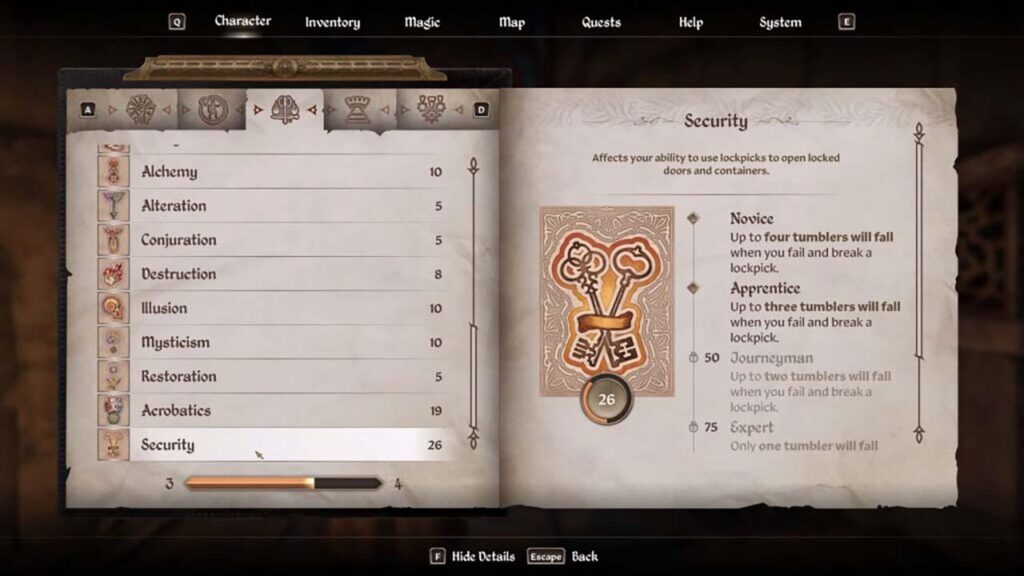
- You can also use magical spells like “Open Easy Lock” to bypass the minigame.
Advanced Lockpicking Tips and Tricks
Once you’ve mastered the basics, it’s time to tackle those frustrating Hard and Very Hard locks. Here are some expert tips to become a true Oblivion lockpicking master:
1. Perfect the Rhythm: Each tumbler has a unique speed and sound profile when pushed. Listen carefully and learn to recognize the differences. This will allow you to anticipate the perfect time to lock it in place.
2. Look for Practice Opportunities: Not every lock will punish you severely for failure. Take time to practice on Easy and Average locks in early-game areas like the Imperial City Waterfront or guild halls. Make mistakes, learn the rhythms, and refine your technique.
3. Boost Your Security Temporarily: If you’re struggling with a particularly hard lock, consider consuming potions or wearing gear that raises your Security skill temporarily. Even a small boost can make a big difference.
4. Join the Thieves Guild: Apart from their role in the criminal underworld, the Thieves Guild offers access to a consistent supply of lockpicks and opportunities to sharpen your lockpicking skills.
5. Combine Stealth and Lockpicking: Roleplaying as a sneaky thief? Use lockpicking alongside stealth mechanics to open doors or chests silently, avoiding detection entirely. This is especially useful for nighttime heists or dungeon runs.
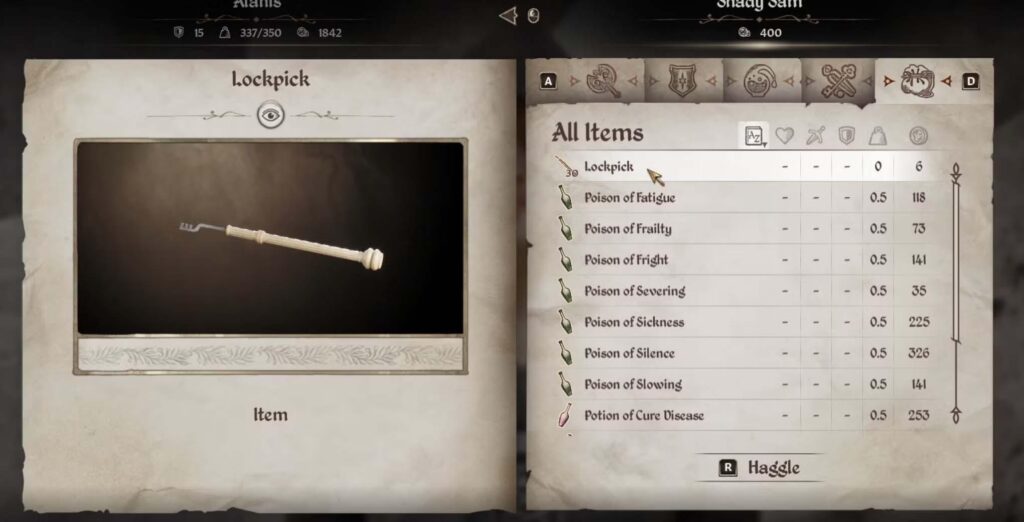
- Joining it unlocks special jobs, fences for stolen goods, and a rich questline led by the Gray Fox.
Using the Auto-Attempt Feature: Should You Trust It?
The Auto-Attempt option allows the game to try Oblivion lockpicking for you. It’s a convenient choice, but there are some key factors to consider before relying on it:
1. Pros of Auto-Attempt:
– If your Security skill is high (Journeyman or above), auto-attempt becomes more reliable. Easy and Average locks are often picked successfully with little effort.
2. Cons of Auto-Attempt:
– For harder locks (Hard and Very Hard), success rates are significantly lower, meaning you’ll waste lockpicks more often. Manual picking is almost always better in these cases.
3. Best Times to Use It:
– Auto-attempt is great when the lock has few tumblers, or if you’re in a hurry and don’t mind sacrificing a few lockpicks. For high-stakes locks, avoid them and stick with manual picking instead.
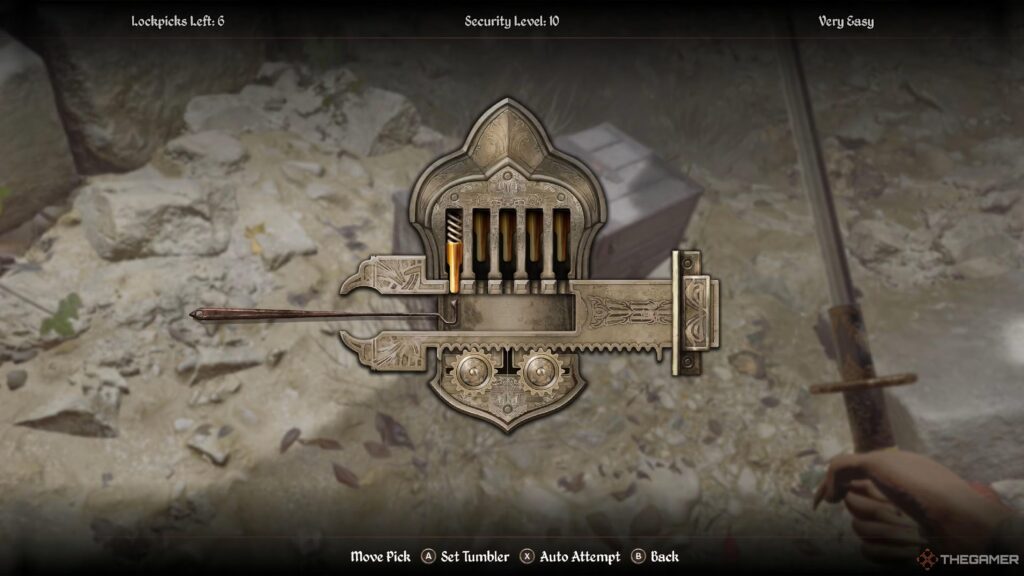
- Timing is crucial; click to set a tumbler at the top before it falls back down.
Solving Common Lockpicking Challenges
Lockpicking can be a headache at times, but these solutions will help you overcome common problems you may face in Oblivion:
1. Running Out of Lockpicks:
– Check with NPC fences in the Thieves Guild. They stock lockpicks regularly. Alternatively, search dungeons, purchase from specific merchants, or loot them from enemies.
2. Failing Repeatedly on Hard Locks:
– Practice makes perfect. If you’re struggling, pause and find easier locks to practice with. Don’t be afraid to walk away temporarily and come back with improved skills or buffs for Oblivion lockpicking.
3. Tumbler Speed Throws You Off:
– Pay attention to patterns. As you progress, you’ll notice some tumblers follow consistent behaviors. Focus on identifying slow-moving tumblers, as they’re easier to pick.
4. Locks You Can’t Open at All (Impossible Locks):
– These typically require an alternative approach, such as a quest key or a spell. If you’re not playing a thief, consider carrying high-tier Open Lock spells just in case.

- The ultimate reward is the Gray Cowl of Nocturnal, granting powerful stealth abilities and a hidden identity.
Lockpicking Rewards: What’s Waiting Behind Locked Doors
Why master lockpicking in Oblivion? Because the rewards make it worth every broken lockpick. Here are just a few things waiting for you behind those barriers:
1. Gold and Valuables: Locked chests and doors often contain high-value loot like gold coins, jewelry, or enchanted gear.
2. Rare Items: Certain locked chests house unique treasures or quest-related items that aren’t available elsewhere.
3. Hidden Areas: Some dungeons and buildings have secret rooms or hidden compartments accessible only through locks. Mastering lockpicking ensures you won’t miss out.
4. Quest Progress: Many side quests and guild objectives require picking locks to obtain critical items or reach specific locations.
The beauty of Oblivion lockpicking is that it adds layers of exploration, making every chest or locked door a potential goldmine.
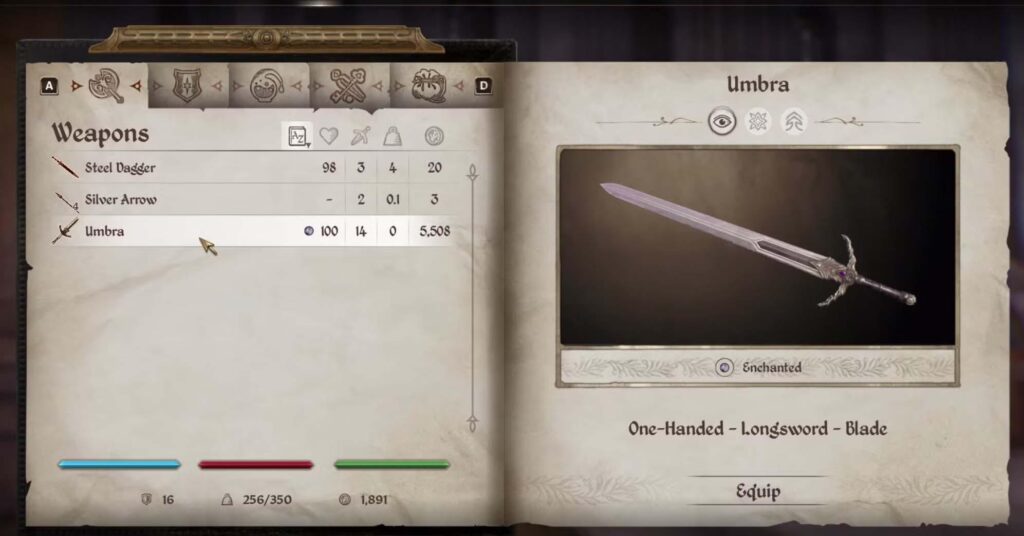
- It’s highly sought after for its high base damage and ability to fill soul gems easily.
Alternatives to Lockpicking in Oblivion
If lockpicking isn’t your style (or you’re tired of snapping lockpicks), don’t worry; there are alternatives to opening locks in Cyrodiil:
1. Magic Spells: Invest in Alteration magic and learn Open Lock spells for different lock levels. It’s a sure-fire way to bypass locks without worrying about your Security skill or lockpick stock.
2. Skeleton Key: This Daedric artifact, once acquired, renders lockpicking stress-free. Use it indefinitely to open locks without fear of breaking it.
3. Quest Keys: Some locked areas require specific keys obtained through quests, eliminating the need for lockpicking altogether.
4. Command NPCs (Modded): If you’re playing with mods, certain companion mods allow NPCs to unlock doors or chests on your behalf; handy for non-thief builds!
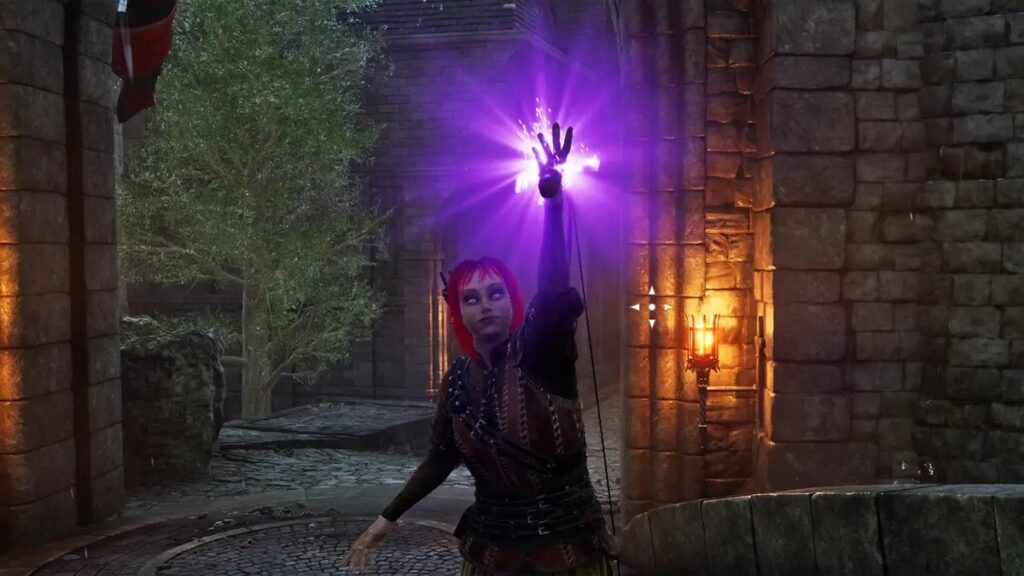
- Its dynamic world, deep lore, and groundbreaking AI made it a landmark RPG of its time.
Finishing Thoughts: Unlocking Mastery in Oblivion
Lockpicking in The Elder Scrolls IV: Oblivion is more than just a mechanic; it’s an art form. Whether you’re cracking open a treasure chest deep in a dungeon or slipping through locked doors in the Imperial City, mastering this skill will elevate your gameplay experience and immerse you further into the world of Cyrodiil. Remember, practice is everything. Take your time, stock up on lockpicks, work on your rhythm, and don’t forget about the helpful bonuses of Oblivion lockpicking like the Skeleton Key or Thieves Guild resources. Every lock you open brings you closer to amazing rewards, intriguing secrets, and epic loot. So, grab those picks, fine-tune your technique, and happy unlocking!
Read the on-demand Gaming Guides via Gamerative.
FAQs
1. How does the Skeleton Key differ from regular lockpicks?
The Skeleton Key is a Daedric artifact that acts as an unbreakable lockpick. It also grants a +40 Security skill boost while in your inventory, making lockpicking significantly easier, especially for harder locks.
2. Can you pick every lock in Oblivion without leveling Security?
Technically, yes, but it’s much harder. Low Security skill makes locks with multiple tumblers frustrating and costly in terms of lockpicks. Buffs, potions, or tools like the Skeleton Key make things easier.
3. What are some good early-game locations to practice lockpicking?
The Imperial City Waterfront has lower-tier homes and warehouses with Easy or Average locks you can work on. Early dungeons, like ones near the starting city of Kvatch, also offer several low-level locks.
4. Is there a penalty for repeatedly failing to pick locks?
No direct in-game penalty exists beyond wasting lockpicks. However, failing high-level locks too often can deplete your lockpick supply, which can be frustrating early on. Always carry spares!




